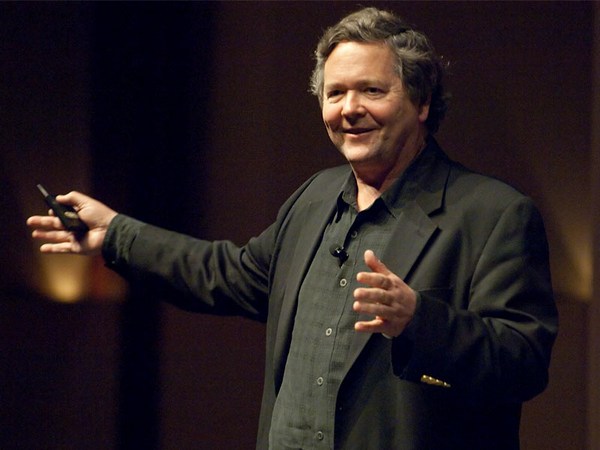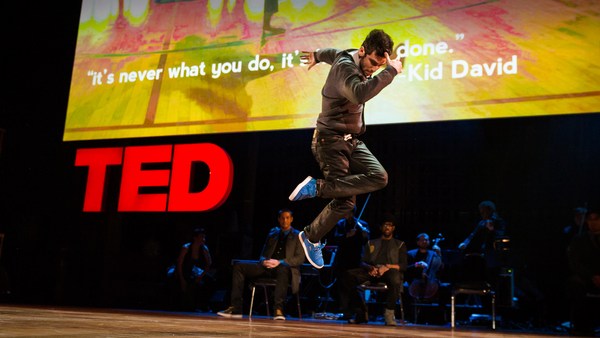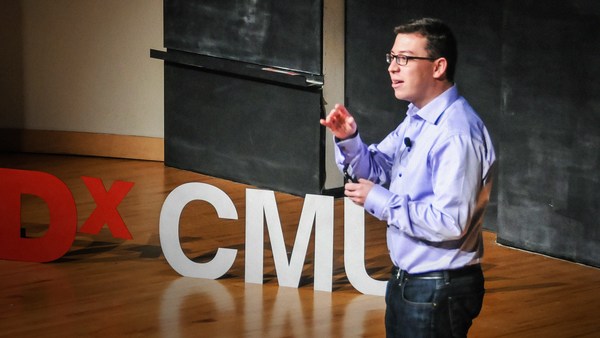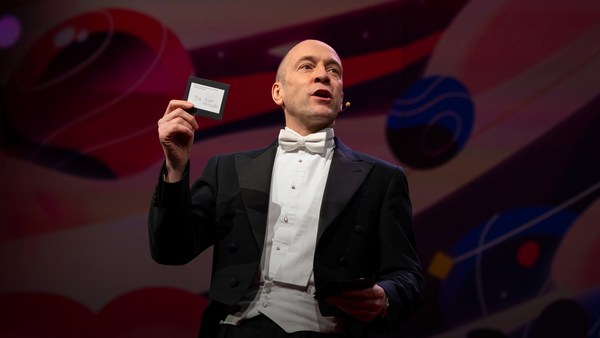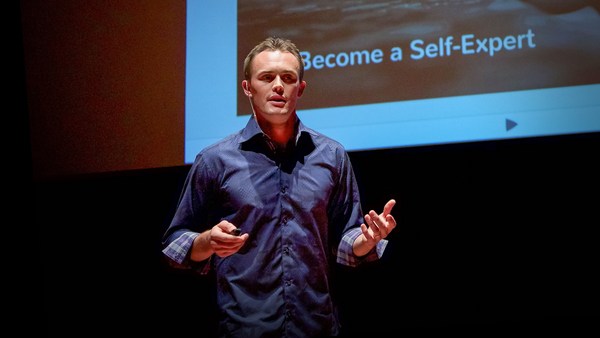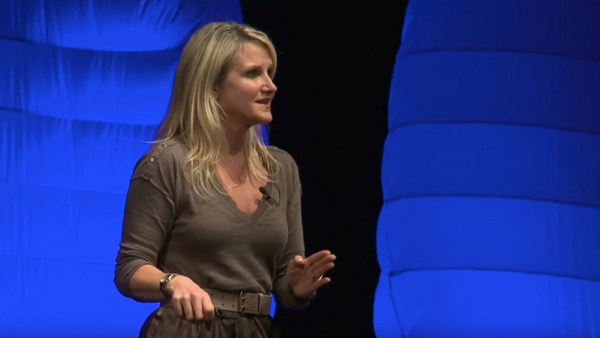(Music)
(Music) (Music ends)
(Applause)
So, that's what I've done with my life.
(Laughter)
(Applause)
Thank you.
(Applause)
As a kid, I grew up on a farm in Florida, and I did what most little kids do. I played a little baseball, did a few other things like that, but I always had the sense of being an outsider, and it wasn't until I saw pictures in the magazines that a couple other guys skate, I thought, "Wow, that's for me," you know? Because there was no coach standing directly over you, and these guys, they were just being themselves. There was no opponent directly across from you. And I loved that sense, so I started skating when I was about 10 years old, in 1977, and when I did, I picked it up pretty quickly. In fact, here's some footage from about 1984. It wasn't until 79 I won my first amateur championship, and then, by 81, I was 14, and I won my first world championship, which was amazing to me, and in a very real sense, that was the first real victory I had.
Oh, watch this. This is a Casper slide, where the board's upside down. Mental note on that one.
(Laughter)
And this one here? An ollie. So, as she mentioned, that is overstated for sure, but that's why they called me the godfather of modern street skating. Here's some images of that.
Now, I was about halfway through my pro career in, I would say, the mid-'80s. Freestyle itself -- we developed all these flat ground tricks, as you saw, but there was evolving a new kind of skateboarding, where guys were taking it to the streets, and they were using that ollie, like I showed you. They were using it to get up onto stuff like bleachers and handrails and over stairwells and all kinds of cool stuff. So it was evolving upwards. In fact, when someone tells you they're a skater today, they pretty much mean a street skater, because freestyle, it took about five years for it to die, and at that stage, I'd been a "champion" champion for 11 years, which -- Phew! And suddenly, it was over for me, that's it -- it was gone. They took my pro model off the shelf, which was essentially pronouncing you dead, publicly. That's how you make your money, you know? You have a signature board and wheels and shoes and clothes. I had all that stuff, and it's gone.
The crazy thing was, there was a really liberating sense about it, because I no longer had to protect my record as a champion. "Champion," again. Champion sounds so goofy, but it's what it was, right? What drew me to skateboarding, the freedom, was now restored, where I could just create things, because that's where the joy was for me, always, was creating new stuff. The other thing that I had was a deep well of tricks to draw from that were rooted in these flat ground tricks. Stuff the normal guys were doing was very much different.
So, as humbling and rotten as it was — And believe me, it was rotten. I would go to skate spots, and I was already "famous guy," right? And everyone thought I was good, but in this new terrain, I was horrible. So people would go, "Oh, what happened to Mullen?"
(Laughter)
So, humbling as it was, I began again. Here are some tricks that I started to bring to that new terrain. And again, there's this undergirding layer of influence of freestyle -- Oh, that one? That's, like, the hardest thing I've ever done. OK, look at that, it's a Darkslide. See how it's sliding on the backside? Those are super fun, and, actually, not that hard. You know, at the very root of that, see, Caspers, see how you throw it? Simple as that, right? No biggie. And your front foot, the way it grabs it -- I'd seen someone slide on the back of the board like that, and I was like, "How can I get it over?" Because that had not yet been done. And then it dawned on me, and here's part of what I'm saying. I had an infrastructure. I had this deep layer, where it was like, oh my gosh, it's just your foot. It's just the way you throw your board over. Just let the ledge do that, and it's easy, and the next thing you know, there's 20 more tricks based out of the variations.
So that's the kind of thing -- here, check this out, here's another way, and I won't overdo this. A little indulgent, I understand. There's something called a Primo slide. It is the funnest trick ever to do. It's like skimboarding.
And this one, look how it slides sideways, every which way? OK, so when you're skating, and you take a fall, the board slips that way or that way; it's kind of predictable. This? It goes every which way -- it's like a cartoon, the falls, and that's what I love the most about it. It's so much fun to do. In fact, when I started doing them, I remember, because I got hurt. I had to get a knee surgery, right? So there were a couple of weeks where I couldn't skate at all. It would give out on me, and I would watch the guys, I'd go to this warehouse where a lot of the guys were skating, my friends, and I was like, "I've got to do something new, I want to do something new. I want to start fresh." And so the night before my surgery, I'd watched, and I was like, "How am I going to do this?" So I ran up, and I jumped on my board, and I Cavemanned, and I flipped it down, and I remember thinking, I landed so light-footed, thinking, if my knee gives, they'll just have more work to do in the morning.
(Laughter)
And so, when it was the crazy thing. I don't know how many of you guys have had surgery, but --
(Laughter)
you are so helpless, right? You're on this gurney and you're watching the ceiling go by, every time, it's always that, and right when they're putting the mask on you before you go to sleep, all I was thinking is, "Man, when I wake up and I get better, the first thing I'm going to do is film that trick." And indeed I did, it was the very first thing I filmed, which was awesome.
I told you a little bit about the evolution of the tricks. Consider that content, in a sense. What we do as street skaters is, you have these tricks -- Say I'm working on Darkslides, or a Primo, that you guys know this stuff now.
(Laughter)
What you do is, you cruise around the same streets that you've seen a hundred times, but suddenly, because you already have something in this fixed domain of this target, it's like, what will match this trick? How can I expand, how can the context, how can the environment change the very nature of what I do? So you drive and drive and drive, and, actually I've got to admit, just because I was struggling with this because I'm here, but I'll just say it, is, I cannot tell you, not only to be here in front of you, but what a privilege it is to be at US campus, because I have been escorted off of this campus so many times.
(Laughter)
(Applause)
So let me give you another example of how context shapes content. This is a place not that far from here, It's a rotten neighborhood. Your first consideration is, am I going to get beat up? You go out and -- See this wall? It's fairly mellow, and it's beckoning to do bank tricks, right? But there's this other aspect of it for wheelies, so check this out. There's a few tricks, again, how environment changes the nature of your tricks. Freestyle oriented, manual down -- wheelie down. Watch, this one? Oh, I love this, it's like surfing, this one, the way you catch it. This one, a little sketchy going backwards, and watch the back foot. Oops --
(Laughter)
Mental note right there. Again, we'll get back to that.
(Laughter)
Here, back foot, back foot. OK, up there? That was called a 360 flip. Notice how the board flipped and spun this way, both axes.
And another example of how the context changed, and the creative process for me and for most skaters, is, you go, you get out of the car, you check for security, you check for stuff.
(Laughter)
It's funny, you get to know their rhythms, you know, the guys that cruise around --
(Laughter)
Skateboarding is such a humbling thing, man. No matter how good you are, you've still got to deal with -- So you hit this wall, and when I hit it, the first thing you do is you fall forward, and I'm like, all right, all right. As you adjust ... you punch it up, and then when I would do that, it was throwing my shoulder this way ... which as I was doing it, I was like, "Oh wow, that's begging for a 360 flip," because that's how you load up for a 360 flip.
And so this is what I want to emphasize that, as you can imagine, all of these tricks are made of submovements, executive motor functions, more granular to the degree to which I can't quite tell you, but one thing I do know is, every trick is made of combining two or three or four or five movements. And so, as I'm going up, these things are floating around, and you have to sort of let the cognitive mind rest back, pull it back a little bit, and let your intuition go as you feel these things. And these submovements are kind of floating around, and as the wall hits you, they connect themselves to an extent, and that's when the cognitive mind: "Oh, 360 flip, I'm going to make that." So that's how that works to me, the creative process, the process itself, of street skating.
So, next -- Oh, mind you ...
(Laughter)
Those are the community. These are some of the best skaters in the world. These are my friends -- oh my gosh, they're such good people. And the beauty of skateboarding is that, no one guy is the best. In fact, I know this is rotten to say, they're my friends, but a couple of them actually don't look that comfortable on their board. What makes them great is the degree to which they use their skateboarding to individuate themselves. Every single one of these guys, you look at them, you can see a silhouette of them, and you realize, "Oh, that's him, that's Haslam, that's Koston, there's these guys, these are the guys."
And skaters, I think they tend to be outsiders who seek a sense of belonging, but belonging on their own terms. And real respect is given by how much we take what other guys do, these basic tricks, 360 flips, we take that, we make it our own, and then we contribute back to the community the inner way that edifies the community itself. The greater the contribution, the more we express and form our individuality, which is so important to a lot of us who feel like rejects to begin with. The summation of that gives us something we could never achieve as an individual. I should say this. There's some sort of beautiful symmetry that the degree to which we connect to a community is in proportion to our individuality, which we are expressing by what we do.
Next, these guys, very similar community that's extremely conducive to innovation.
(Laughter)
Notice a couple of these shots from the police department. But it is quite similar, I mean, what is it to hack, right? It's knowing a technology so well that you can manipulate it and steer it to do things it was never intended to do, right? And they're not all bad. You can be a Linux kernel hacker, make it more stable, right? More safe, more secure. You can be an iOS hacker, make your iPhone do stuff it wasn't supposed to. Not authorized, but not illegal. And then, you've got some of these guys, right? What they do is very similar to our creative process. They connect disparate information, and they bring it together in a way that a security analyst doesn't expect. It doesn't make them good people, but it's at the heart of engineering, at the heart of a creative community, an innovative community, and the open source community, the basic ethos of it is, take what other people do, make it better, give it back so we all rise further. Very similar communities, very similar.
We have our edgier sides, too.
(Laughter)
It's funny, my dad was right. These are my peers. But I respect what they do, and they respect what I do, because they can do things, it's amazing what they can do. In fact, one of them, he was Ernst & Young's Entrepreneur of the Year for San Diego County, so they're not -- you never know who you're dealing with.
We've all had some degree of fame. In fact, I've had so much success that I strangely always feel unworthy of. I've had a patent, and that was cool, and we started a company, and it grew, and it became the biggest, and then it went down, and then it became the biggest again, which is harder than the first time, and then we sold it, and then we sold it again. So I've had some success. And in the end, when you've had all of these things, what is it that continues to drive you? As I mentioned, the knee stuff and these things, what is it that will punch you? Because it's not just the mind. What is it that will punch you and make you do something and bring it to another level, and when you've had it all, sometimes, guys, they die on the vine with all of that talent, and one of the things we've had, all of us, is fame -- I think the best kind of fame, because you can take it off. I've been all around the world, and there will be a thousand kids crying out your name, and it's such a weird, visceral experience. It's like, it's disorienting. And you get in a car, and you drive away, and 10-minute drive, and you get out, and no one gives a rat's who you are.
(Laughter)
And it gives you that clarity of perspective of, man, I'm just me, and popularity, what does that really mean again? Not much. It's peer respect that drives us. That's the one thing that makes us do what we do. I've had over a dozen bones, this guy, over, eight, 10 concussions, to the point where it's comedy, right? It is actually comedy, they mess with him.
(Laughter)
Next, and this is something deeper. I think I was on tour when I was reading one of the Feynman biographies. It was the red one or the blue one. And he made this statement that was so profound to me. It was that the Nobel Prize was the tombstone on all great work, and it resonated because I had won 35 out of 36 contests that I'd entered over 11 years, and it made me bananas. In fact, winning isn't the word, I won it once. The rest of the time, you're just defending, and you get into this, turtle posture, you know? Where you're not doing -- it usurped the joy of what I loved to do because I was no longer doing it to create and have fun, and when it died out from under me, that was one of the most liberating things, because I could create.
And look, I understand that I am on the very edge of preachy, here. I'm not here to do that. It's just that I'm in front of a very privileged audience. If you guys aren't already leaders in your community, you probably will be, and if there's anything I can give you that will transcend what I've gotten from skateboarding, the only things of meaning, I think, and of permanence, it's not fame, it's not all these things. What it is, is that there's an intrinsic value in creating something for the sake of creating it, and better than that, because I'm 46 years old, or I'll be 46, and how pathetic is that I'm still skateboarding, but there is -- there is this beauty in dropping it into a community of your own making, and seeing it dispersed, and seeing younger, more talented, just different talent, take it to levels you can never imagine, because that lives on. So thank you for your time.
(Applause)
Kristina Holly: I have a question for you.
(Applause)
So you've really reinvented yourself in the past, from freestyle to street, and, I think it was about four years ago you officially retired. Is that it? What's next?
Rodney Mullen: That's a good question. KG: Something tells me it's not the end.
RM: Yeah. Every time you think you've chased something down, it's funny, no matter how good you are, and I know guys like this, it feels like you're polishing a turd, you know?
(Laughter)
And I thought, the only way I can extend this is to change something infrastructural. And so that's what I proceeded to do, through a long story, one of desperation, so if I do it, rather than talk about it, if I do it, you'll be the first to know.
KG: All right, we won't ask you any more. RM: You'll get a text.
KG: Right, thank you, good job. RM: Thank you. Thank you.
(Applause)
